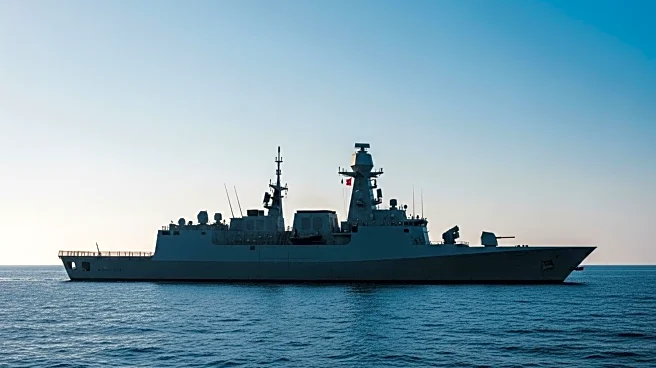What's Happening?
The Norwegian government has announced its decision to acquire at least five Type 26 anti-submarine warfare frigates from the UK, marking Norway's largest defense capability investment to date. This strategic partnership, valued at GBP10 billion (USD13.5 billion), was revealed by Norwegian Prime Minister Jonas Støre during a press conference on August 31, 2025. The frigates will be constructed by BAE Systems in Scotland, with the first expected to be delivered around 2030. This decision follows Norway's Long-term Defence Plan 2025–36, which outlined the need to replace the Royal Norwegian Navy's Fridtjof Nansen-class frigates. The Type 26 was chosen over candidates from France, Germany, and the USA, increasing the total number of Type 26 frigates to be built by BAE Systems to 13.
Why It's Important?
This acquisition represents a significant boost to Norway's naval capabilities, enhancing its ability to conduct anti-submarine warfare operations in the North Atlantic and High North. The deal also underscores the strengthening of defense ties between Norway and the UK, potentially influencing geopolitical dynamics in the region. For the UK, this is the largest warship export deal by value, highlighting the global competitiveness of its defense industry. The construction of these frigates will likely support jobs and economic activity in Scotland, contributing to the local economy. Additionally, the increased presence of Type 26 frigates in the North Atlantic may impact regional security and defense strategies.
What's Next?
The construction of the frigates will commence at BAE Systems' facilities in Scotland, with the first Norwegian frigate expected to be delivered by 2030. As the project progresses, both Norway and the UK will likely engage in further collaboration to ensure the successful integration of these vessels into the Royal Norwegian Navy. The deal may prompt other countries to consider similar acquisitions, potentially leading to increased demand for the Type 26 frigates globally. Additionally, Norway's decision may influence future defense procurement strategies within the region.








